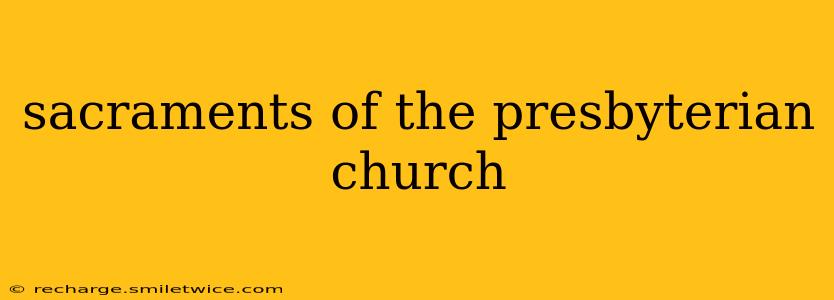Presbyterian churches, rooted in the Reformed tradition of Protestantism, observe two ordinances—Baptism and the Lord's Supper—as sacraments. Unlike some denominations that recognize a larger number of sacraments, Presbyterians view these two as the only ones instituted by Christ himself. This understanding shapes their theological perspectives and liturgical practices. This guide will explore the meaning and significance of these sacraments within Presbyterianism.
What are the Sacraments in the Presbyterian Church?
Presbyterian theology emphasizes the importance of God's grace and the role of sacraments as visible signs of God's invisible grace. These ordinances are not merely symbolic rituals but are considered means of grace, through which God communicates his love and forgiveness to believers.
The two sacraments observed by Presbyterian churches are:
- Baptism: A public declaration of faith and commitment to Christ, symbolizing cleansing from sin and new life in the Holy Spirit.
- The Lord's Supper (Communion): A commemoration of Christ's sacrifice on the cross, where believers partake in bread and wine, symbolizing Christ's body and blood, respectively. This act signifies unity with Christ and fellow believers.
What is Baptism in the Presbyterian Church?
Presbyterian churches generally practice infant baptism, believing that baptism is a sign of God's covenant promise extended to individuals and their families. This practice is rooted in the Old Testament understanding of covenant and the New Testament's account of household baptisms. However, many Presbyterian churches also welcome believer's baptism for those who profess faith later in life.
What does infant baptism symbolize in Presbyterianism?
Infant baptism symbolizes the inclusion of the child into the covenant community of faith. It’s a public declaration of God's grace and a commitment by parents to raise their child within the Christian faith. It signifies cleansing from original sin and the promise of God's grace throughout life. Importantly, it does not automatically guarantee salvation, as salvation is by God's grace through faith in Jesus Christ.
How is baptism performed in a Presbyterian church?
Baptism is typically performed through sprinkling or pouring water onto the forehead of the individual. Immersion is also practiced in some Presbyterian churches, though less common. The service often includes prayers, scripture readings, and a sermon emphasizing the meaning of baptism.
What is the Lord's Supper (Communion) in the Presbyterian Church?
The Lord's Supper, also known as Holy Communion or the Eucharist, is a central act of worship in Presbyterian churches. It is a time of remembrance, thanksgiving, and spiritual renewal.
What does the Lord's Supper symbolize in Presbyterianism?
Presbyterians hold a Reformed understanding of the Lord's Supper, often referred to as Zwinglian or a nuanced variation. They believe the bread and wine are symbolic representations of Christ's body and blood, rather than a literal transformation (transubstantiation). They signify Christ's sacrifice, his presence amongst his people, and the unity of believers in the body of Christ.
How is the Lord's Supper celebrated in a Presbyterian church?
The Lord's Supper is typically celebrated during a worship service. It involves the reading of scripture passages relating to the Last Supper, prayers of thanksgiving, and the distribution of bread and wine to those who profess faith in Christ. The service emphasizes self-examination, repentance, and a renewed commitment to follow Christ.
Are there other sacraments in Presbyterianism?
No. Presbyterian churches, based on their understanding of scripture, recognize only baptism and the Lord's Supper as sacraments instituted by Christ. Other religious practices, such as marriage or ordination, are considered sacred rites or ordinances, but not sacraments in the same theological sense.
What are the differences between Presbyterian and other Protestant sacraments?
The primary difference lies in the number of sacraments recognized. Some denominations, like Catholics and Lutherans, recognize additional sacraments, while Presbyterians firmly maintain that only baptism and the Lord's Supper are explicitly instituted by Christ. Furthermore, the understanding of the Lord's Supper varies significantly among denominations. Presbyterians, with their Reformed perspective, differ from those holding a transubstantiation or consubstantiation view.
This comprehensive overview provides a deeper understanding of the sacraments within the Presbyterian Church. It's crucial to remember that individual Presbyterian churches may have slight variations in their liturgical practices, but the core theological understanding of these sacraments remains consistent within the denomination.
